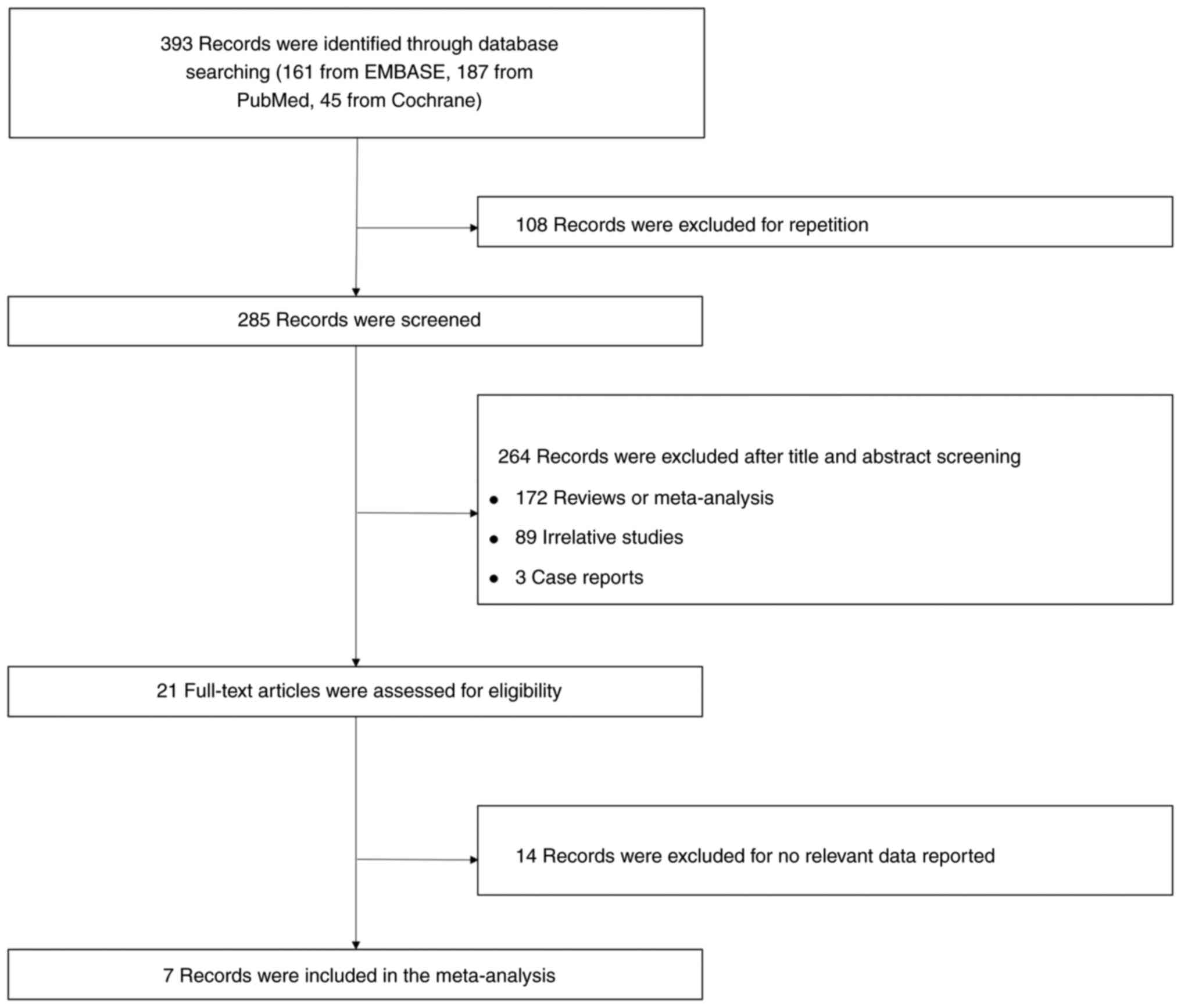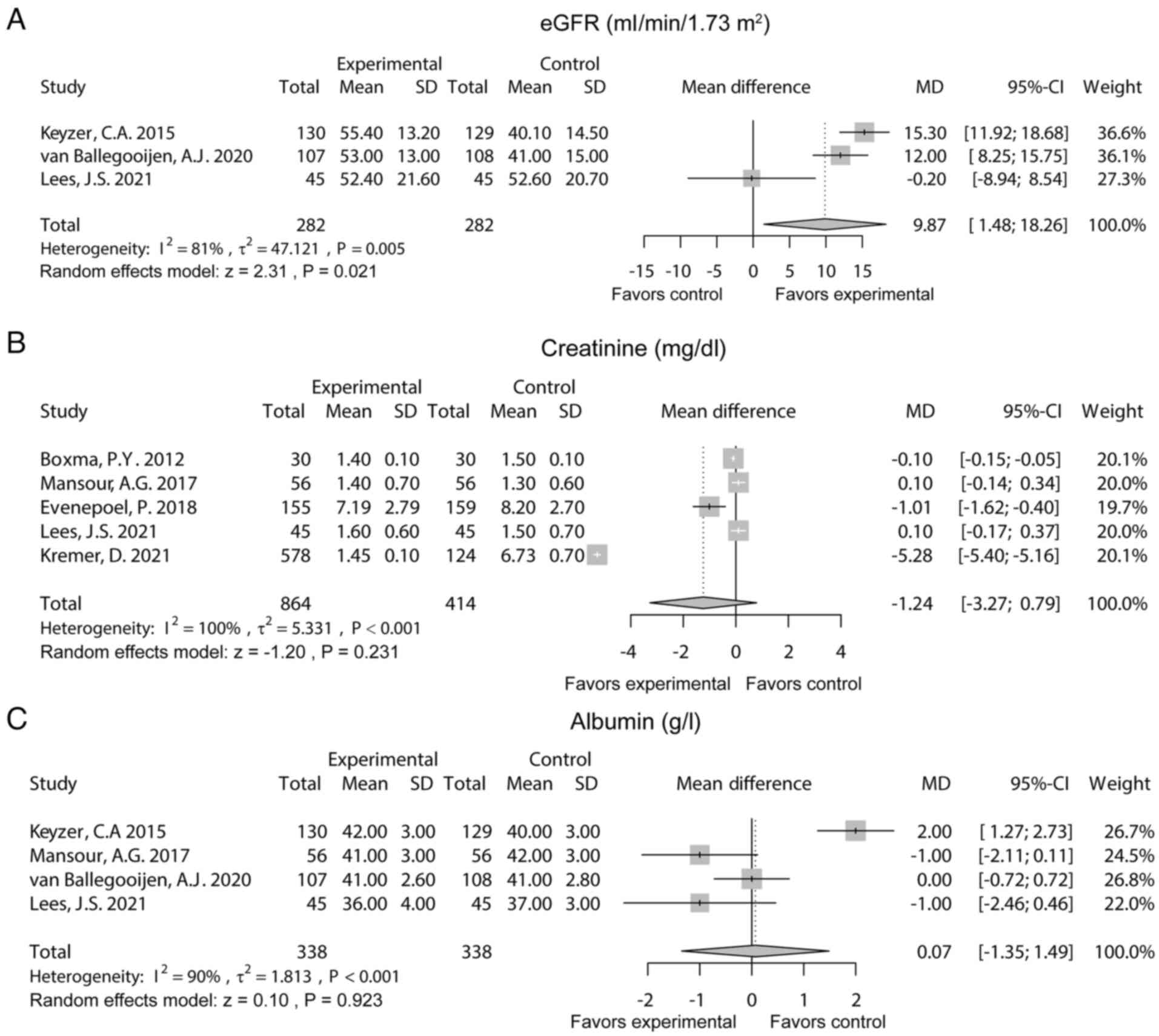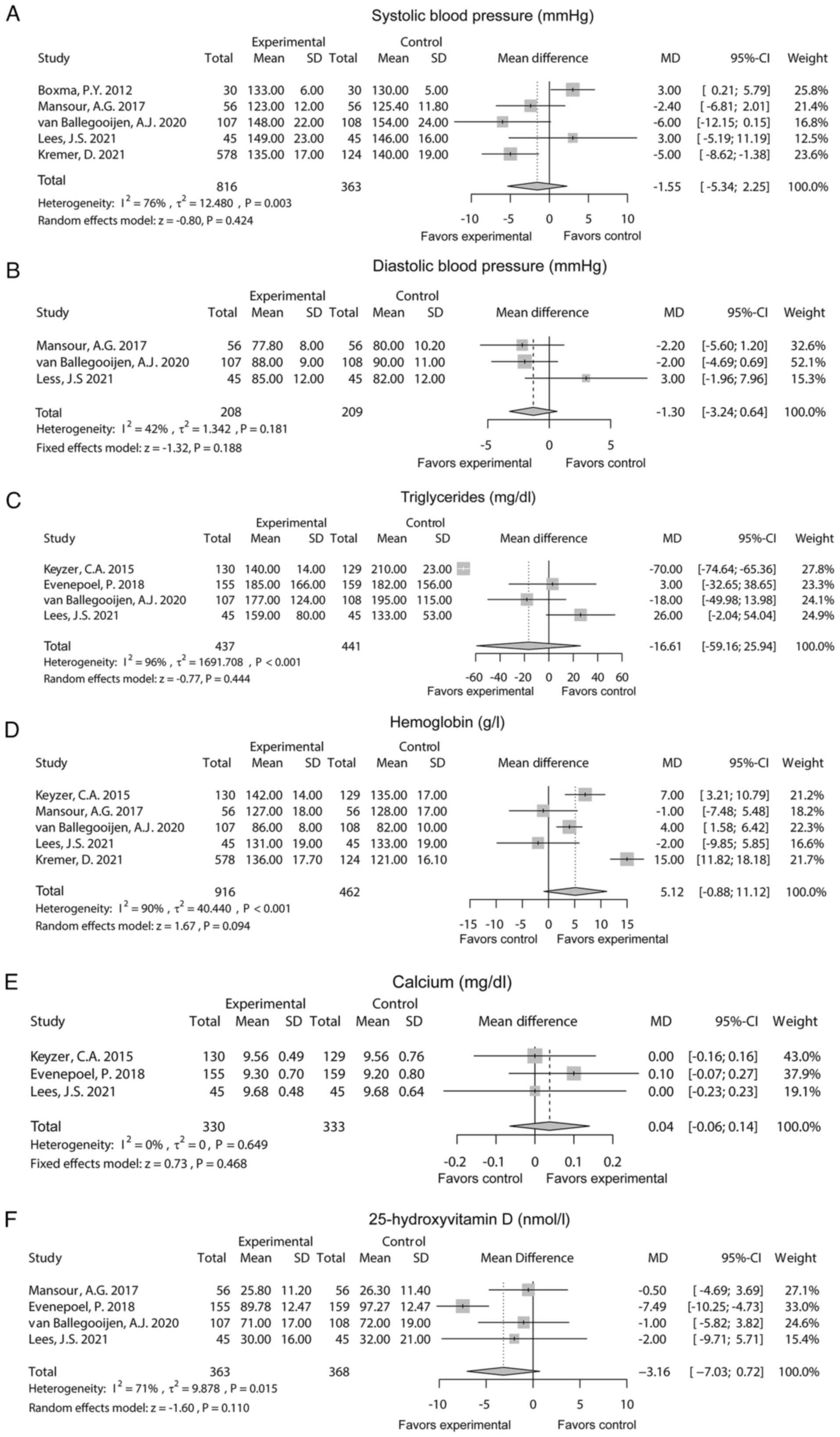|
1
|
Wouk N: End-stage renal disease: Medical
management. Am Fam Physician. 104:493–499. 2021.PubMed/NCBI
|
|
2
|
Wang Y, Hemmelder MH, Bos WJW, Snoep JD,
de Vries APJ, Dekker FW and Meuleman Y: Mapping health-related
quality of life after kidney transplantation by group comparisons:
A systematic review. Nephrol Dial Transplant. 36:2327–2339.
2021.PubMed/NCBI View Article : Google Scholar
|
|
3
|
Axelrod DA, Schnitzler MA, Xiao H, Irish
W, Tuttle-Newhall E, Chang SH, Kasiske BL, Alhamad T and Lentine
KL: An economic assessment of contemporary kidney transplant
practice. Am J Transplant. 18:1168–1176. 2018.PubMed/NCBI View Article : Google Scholar
|
|
4
|
Agrawal A, Ison MG and Danziger-Isakov L:
Long-term infectious complications of kidney transplantation. Clin
J Am Soc Nephrol. 17:286–295. 2022.PubMed/NCBI View Article : Google Scholar
|
|
5
|
Sotomayor CG, Benjamens S, Gomes-Neto AW,
Pol RA, Groothof D, Te Velde-Keyzer CA, Chong G, Glaudemans AWJM,
Berger SP, Bakker SJL and Slart RHJA: Bone mineral density and
aortic calcification: evidence for a bone-vascular axis after
kidney transplantation. Transplantation. 105:231–239.
2021.PubMed/NCBI View Article : Google Scholar
|
|
6
|
Ponticelli C, Favi E and Ferraresso M:
New-onset diabetes after kidney transplantation. Medicina (Kaunas).
57(250)2021.PubMed/NCBI View Article : Google Scholar
|
|
7
|
Ponticelli C, Reggiani F and Moroni G:
Delayed graft function in kidney transplant: Risk factors,
Consequences and prevention strategies. J Pers Med.
12:2022.PubMed/NCBI View Article : Google Scholar
|
|
8
|
Bahl D, Haddad Z, Datoo A and Qazi YA:
Delayed graft function in kidney transplantation. Curr Opin Organ
Transplant. 24:82–86. 2019.PubMed/NCBI View Article : Google Scholar
|
|
9
|
Haberal M, Boyvat F, Akdur A, Kirnap M,
Ozcelik U and Yarbug Karakayali F: Surgical complications after
kidney transplantation. Exp Clin Transplant. 14:587–595.
2016.PubMed/NCBI
|
|
10
|
Ammi M, Daligault M, Sayegh J, Abraham P,
Papon X, Enon B and Picquet J: Evaluation of the vascular surgical
complications of renal transplantation. Ann Vasc Surg. 33:23–30.
2016.PubMed/NCBI View Article : Google Scholar
|
|
11
|
Ghadiani MH, Peyrovi S, Mousavinasab SN
and Jalalzadeh M: Delayed graft function, allograft and patient
srvival in kidney transplantation. Arab J Nephrol Transplant.
5:19–24. 2012.PubMed/NCBI
|
|
12
|
Cozzolino M, Mangano M, Galassi A, Ciceri
P, Messa P and Nigwekar S: Vitamin K in chronic kidney disease.
Nutrients. 11(168)2019.PubMed/NCBI View Article : Google Scholar
|
|
13
|
Eelderink C, Kremer D, Riphagen IJ, Knobbe
TJ, Schurgers LJ, Pasch A, Mulder DJ, Corpeleijn E, Navis G, Bakker
SJL, et al: Effect of vitamin K supplementation on serum
calcification propensity and arterial stiffness in vitamin
K-deficient kidney transplant recipients: A double-blind,
randomized, placebo-controlled clinical trial. Am J Transplant.
23:520–530. 2023.PubMed/NCBI View Article : Google Scholar
|
|
14
|
Boxma PY, van den Berg E, Geleijnse JM,
Laverman GD, Schurgers LJ, Vermeer C, Kema IP, Muskiet FA, Navis G,
Bakker SJ and de Borst MH: Vitamin K intake and plasma
desphospho-uncarboxylated matrix Gla-protein levels in kidney
transplant recipients. PLoS One. 7(e47991)2012.PubMed/NCBI View Article : Google Scholar
|
|
15
|
Keyzer CA, Vermeer C, Joosten MM, Knapen
MH, Drummen NE, Navis G, Bakker SJ and de Borst MH: Vitamin K
status and mortality after kidney transplantation: A cohort study.
Am J Kidney Dis. 65:474–483. 2015.PubMed/NCBI View Article : Google Scholar
|
|
16
|
Mansour AG, Hariri E, Daaboul Y, Korjian
S, El Alam A, Protogerou AD, Kilany H, Karam A, Stephan A and
Bahous SA: Vitamin K2 supplementation and arterial stiffness among
renal transplant recipients-a single-arm, single-center clinical
trial. J Am Soc Hypertens. 11:589–597. 2017.PubMed/NCBI View Article : Google Scholar
|
|
17
|
Evenepoel P, Claes K, Meijers B, Laurent
M, Bammens B, Naesens M, Sprangers B, Pottel H, Cavalier E and
Kuypers D: Poor vitamin K status is associated with low bone
mineral density and increased fracture risk in end-stage renal
disease. J Bone Miner Res. 34:262–269. 2019.PubMed/NCBI View Article : Google Scholar
|
|
18
|
van Ballegooijen AJ, Beulens JWJ, Keyzer
CA, Navis GJ, Berger SP, de Borst MH, Vervloet MG and Bakker SJL:
Joint association of vitamins D and K status with long-term
outcomes in stable kidney transplant recipients. Nephrol Dial
Transplant. 35:706–714. 2020.PubMed/NCBI View Article : Google Scholar
|
|
19
|
Lees JS, Rankin AJ, Gillis KA, Zhu LY,
Mangion K, Rutherford E, Roditi GH, Witham MD, Chantler D,
Panarelli M, et al: The ViKTORIES trial: A randomized,
double-blind, placebo-controlled trial of vitamin K supplementation
to improve vascular health in kidney transplant recipients. Am J
Transplant. 21:3356–3368. 2021.PubMed/NCBI View Article : Google Scholar
|
|
20
|
Kremer D, Groothof D, Keyzer CA, Eelderink
C, Knobbe TJ, Post A, van Londen M, Eisenga MF, TransplantLines
Investigators, Schurgers LJ, et al: Kidney function-dependence of
vitamin K-status parameters: Results from the transplantlines
biobank and cohort studies. Nutrients. 13(3069)2021.PubMed/NCBI View Article : Google Scholar
|
|
21
|
Wells GA, Shea B, O'Connell D, je
Peterson, Welch V, Losos M and Tugwell P: The newcastle-ottawa
scale (NOS) for assessing the quality of nonrandomized studies in
meta-analyses. Ottawa Hospital Research Institute, Ottawa, ON,
2015.
|
|
22
|
Higgins JP, Thompson SG, Deeks JJ and
Altman DG: Measuring inconsistency in meta-analyses. BMJ.
327:557–560. 2003.PubMed/NCBI View Article : Google Scholar
|
|
23
|
R Core Team: A language and environment
for statistical computing. R foundation for statistical computing,
Vienna, 2013. http://www.R-project.org/.
|
|
24
|
RStudio Team: RStudio: Integrated
development for R. RStudio, Inc., Boston MA. 2015. http://www.rstudio.com/.
|
|
25
|
Shioi A, Morioka T, Shoji T and Emoto M:
The inhibitory roles of vitamin K in progression of vascular
calcification. Nutrients. 12(583)2020.PubMed/NCBI View Article : Google Scholar
|
|
26
|
Roumeliotis S, Duni A, Vaios V, Kitsos A,
Liakopoulos V and Dounousi E: Vitamin K supplementation for
prevention of vascular calcification in chronic kidney disease
patients: Are we there yet? Nutrients. 14(925)2022.PubMed/NCBI View Article : Google Scholar
|
|
27
|
Alonso N, Meinitzer A, Fritz-Petrin E,
Enko D and Herrmann M: Role of vitamin K in bone and muscle
metabolism. Calcif Tissue Int. 112:178–196. 2023.PubMed/NCBI View Article : Google Scholar
|
|
28
|
Fusaro M, Cianciolo G, Brandi ML, Ferrari
S, Nickolas TL, Tripepi G, Plebani M, Zaninotto M, Iervasi G, La
Manna G, et al: Vitamin K and osteoporosis. Nutrients.
12(3625)2020.PubMed/NCBI View Article : Google Scholar
|
|
29
|
Bellone F, Cinquegrani M, Nicotera R,
Carullo N, Casarella A, Presta P, Andreucci M, Squadrito G,
Mandraffino G, Prunestì M, et al: Role of vitamin K in chronic
kidney disease: A focus on bone and cardiovascular health. Int J
Mol Sci. 23(5282)2022.PubMed/NCBI View Article : Google Scholar
|
|
30
|
Wei FF, Drummen NE, Thijs L, Jacobs L,
Herfs M, Van't Hoofd C, Vermeer C and Staessen JA:
Vitamin-K-dependent protection of the renal microvasculature:
Histopathological studies in normal and diseased kidneys. Pulse
(Basel). 4:85–91. 2016.PubMed/NCBI View Article : Google Scholar
|
|
31
|
Ohsaki Y, Shirakawa H, Miura A, Giriwono
PE, Sato S, Ohashi A, Iribe M, Goto T and Komai M: Vitamin K
suppresses the lipopolysaccharide-induced expression of
inflammatory cytokines in cultured macrophage-like cells via the
inhibition of the activation of nuclear factor κB through the
repression of IKKα/β phosphorylation. J Nutr Biochem. 21:1120–1126.
2010.PubMed/NCBI View Article : Google Scholar
|
|
32
|
Bordoloi J, Dihingia A, Kalita J and Manna
P: Implication of a novel vitamin K dependent protein, GRP/Ucma in
the pathophysiological conditions associated with vascular and soft
tissue calcification, osteoarthritis, inflammation, and carcinoma.
Int J Biol Macromol. 113:309–316. 2018.PubMed/NCBI View Article : Google Scholar
|
|
33
|
Vermeer C, Shearer MJ, Zittermann A,
Bolton-Smith C, Szulc P, Hodges S, Walter P, Rambeck W, Stöcklin E
and Weber P: Beyond deficiency: Potential benefits of increased
intakes of vitamin K for bone and vascular health. Eur J Nutr.
43:325–335. 2004.PubMed/NCBI View Article : Google Scholar
|
|
34
|
Kluch M, Bednarkiewicz P, Orzechowska M,
Grzelak P and Kurnatowska I: Vitamin K1 and K2 in the diet of
patients in the long term after kidney transplantation. Nutrients.
14(5070)2022.PubMed/NCBI View Article : Google Scholar
|



















